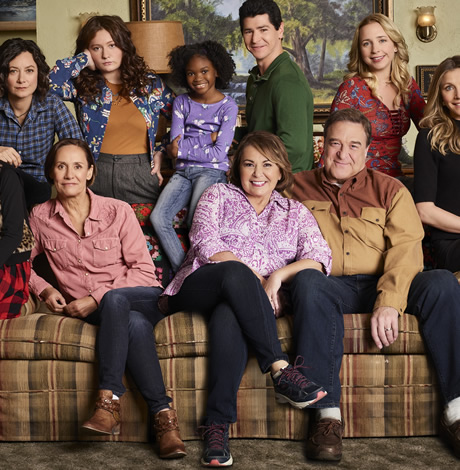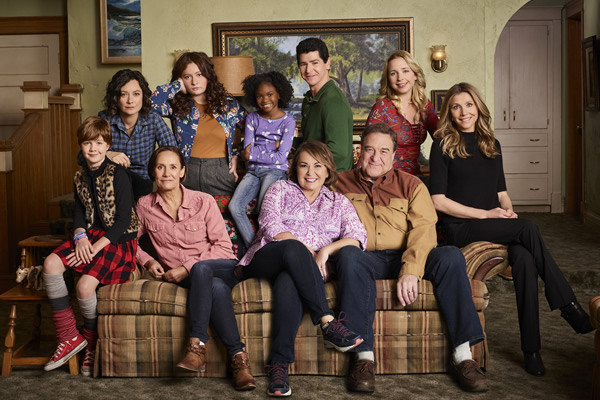Arts & Entertainment
Should gays boot the ‘Roseanne’ reboot?
Transient urban gays should give back to home communities


The original cast of ‘Roseanne’ includes lesbian actress Sara Gilbert (first from left in back row). She both reprises her role as Darlene and is executive producing the eight-episode arc. (Photo courtesy ABC)
The twang of a harmonica, the blare of a saxophone, that grating laugh.
Last week, ABC continued the pop culture wave of ‘90s nostalgia by airing the premiere of its much buzzed-about “Roseanne” revival. The original was never afraid to take an unflinching and unapologetic look at working-class life in America or serve as a showcase for its brash and controversial star, Roseanne Barr. True to form, “Roseanne’s” reboot debut proved the show would be just as bracing and willing to tackle controversial issues head-on through its distinct blend of biting humor and tough love.
It’s off to a gangbusters start with its first new episode in 20 years on March 27 drawing 25 million viewers and a massive 73 rating among adults 18-49. With 6.6 million viewers watching it later, it set a time-shifting record, the Hollywood Reporter notes. Another 4.3 million watched an encore broadcast Sunday night. Hulu and ABC streaming will only add to those numbers. It has the best numbers of a any “new” show since the 2014 premiere of “how to Get Away with Murder.” It’s already been renewed for a second season.
Reassuringly, the revival begins with Roseanne and husband Dan waking up in their old bed. Roseanne says she thought he’d died (cue Dan’s deadpan reply, “Why does everyone always think I’m dead?”), expediently erasing the divisive last season, which revealed the show was a story written by Roseanne, Dan had died and the family never won the lottery (don’t ask).
The rest of the Connor family is reintroduced, including Aunt Jackie, whose conflict with big sister Roseanne anchors the premiere. The two have barely spoken since the 2016 election. Roseanne is pro-Trump (mirroring the actor’s real-life support of the president), and Jackie, sporting a Nasty Woman shirt that would have looked appropriate on her 20 years ago, is ardently not.
Much has been made of Roseanne incorporating its star’s pro-Trump views and I was admittedly hesitant about watching the show and possibly liking it. Would my viewership (and potential enjoyment) tacitly endorse Roseanne’s views and those of her pro-Trump fans? Roseanne has rightfully been praised as a realistic depiction of working-class life in America, and although I may disagree with its star and vast numbers of the show’s viewers, there is no escaping the fact that Trump struck a chord with them for a reason that should not be ignored.
Roseanne saying she voted for Trump because “he talked about jobs” may have been played for a laugh, but she was speaking for a lot of people like the Connors. Although a sitcom isn’t going to resolve the political rift in the country, it can promote real discourse. The tension between Roseanne and Jackie was effective because not only was it true to the characters, it was also real. You could see families like this having these kinds of conversations and therein lies the strength of this show for much of its audience: relatability.
“Roseanne” also focused on middle daughter Darlene’s 9-year-old son, Mark, a happy boy who enjoys doing things like wearing skirts and painting his nails. Darlene supports his self-expression and doesn’t want the family to make him feel self-conscious because of it. Although they don’t understand why a boy would “dress like a girl,” the family embraces Mark. When Dan affirms that Mark shouldn’t go school like that, it isn’t because he’s ashamed, but because he fears Mark will be bullied.
I didn’t expect the show to deal with gender identity and expression so matter-of-factly. That Mark was portrayed as a fully formed person rather than a stereotype, and that the family rallied around him, was an explicit argument that we can all get behind: we should be proud of who we are and able to express that fully without fear of judgment or reprisal.
Mark puts an exclamation point on this idea (and shows that he truly is a Connor) by asserting that he’s going to keep dressing like he wants because he’s not ashamed of who he is. When Dan says, “That’s one tough kid,” how could you not stand up and cheer? I doubt the average Trump supporter is ready to acknowledge (let alone accept) gender non-conformance, but I’m grateful that a show aimed at them is saying it should be celebrated instead of feared.
I understand the concerns over normalizing Trump and certain segments of his base, because a show like “Roseanne” could potentially justify their views. Indeed, this has been a sticking point for many potential fans, especially gays. I’ve heard valid arguments that say the dichotomy of the show’s central character supporting Trump (who curries favor with hate groups) while sticking up for her gender non-conforming grandson is offensive at best, dangerous at worst, because this kind of line straddling could allow and encourage such attitudes to persist.
Nuances like these should not be compartmentalized and “Roseanne” would do well to address this potentially negative duality in future episodes. Although there are no easy answers to these questions, the “resist,” anti-Trump, left-leaning crowd ignores the Roseannes of the world at its own peril. If this show can bridge some divides, provide a glimpse into what “middle America” thinks while also demonstrating that the rest of us aren’t the demons we’re made out to be by many on team Trump, then maybe there’s room for an actual conversation. The jury won’t be in anytime soon, but maybe a show like “Roseanne” can counter or even diffuse the hornet nests of social media and angry op-eds cannot which, let’s face it, mostly just preach to their respective choirs.
At its core, “Roseanne” is a show about family, and while there’s certainly room for improvement (more Jackie!), this is a family worth spending some more time with.
Sports
Bisexual former umpire sues Major League Baseball for sexual harassment
Brandon Cooper claims female colleague sexually harassed him

A fired former umpire is suing Major League Baseball, claiming he was sexually harassed by a female umpire and discriminated against because of his gender and his sexual orientation.
Brandon Cooper worked in the minor league Arizona Complex League last year, and according to the lawsuit he filed Wednesday in federal court in Manhattan, he identifies as bisexual.
“I wanted my umpiring and ability to speak for itself and not to be labeled as ‘Brandon Cooper the bisexual umpire,’” he told Outsports. “I didn’t want to be labeled as something. It has been a passion of mine to simply make it to the Major Leagues.”
But that didn’t happen. Instead of being promoted, he was fired. His suit names MLB and an affiliated entity, PDL Blue, Inc., and alleges he had endured a hostile work environment and wrongful termination and/or retaliation because of gender and sexual orientation under New York State and New York City law.
“Historically the MLB has had a homogenous roster of umpires working in both the minor and major leagues,” Cooper claims in his suit. “Specifically, to date there has never been a woman who has worked in a (regular) season game played in the majors, and most umpires are still Caucasian men. To try to fix its gender and racial diversity issue, defendants have implemented an illegal diversity quota requiring that women be promoted regardless of merit.”
Cooper claims former umpire Ed Rapuano, now an umpire evaluator, and Darren Spagnardi, an umpire development supervisor, told him in January 2023 that MLB had a hiring quota, requiring that at least two women be among 10 new hires.
According to the suit, Cooper was assigned to spring training last year and was notified by the senior manager of umpire administration, Dusty Dellinger, that even though he received a high rating in June from former big league umpire Jim Reynolds, now an umpire supervisor, that women and minority candidates had to be hired first.
Cooper claims that upon learning Cooper was bisexual, fellow umpire Gina Quartararo insulted him and fellow umpire Kevin Bruno by using homophobic slurs and crude remarks. At that time, Quartararo and Cooper worked on the same umpiring crew and being evaluated for possible promotion to the big leagues.
This season, Quartararo is working as an umpire in the Florida State League, one of nine women who are working as minor league umpires.
Cooper said he notified Dellinger, but instead of taking action against Quartararo, he said MLB ordered Cooper to undergo sensitivity training. According to his lawsuit, he was also accused of violating the minor league anti-discrimination and harassment policy.
Cooper’s suit says he met with MLB Senior Vice President of Diversity, Equity and Inclusion Billy Bean — who the Los Angeles Blade reported in December is battling cancer.
The lawsuit says at that meeting, Bean told the umpire that Quartararo claimed she was the victim, as the only female umpire in the ACL. Cooper said he told Bean Quartararo regularly used homophobic slurs and at one point physically shoved him. He also claims that he has video evidence, texts and emails to prove his claim.
But he said his complaints to Major League Baseball officials were ignored. His lawsuit said MLB passed him over for the playoffs and fired him in October. He said of the 26 umpires hired with Cooper, he was the only one let go.
Through a spokesperson, MLB declined to comment on pending litigation. Quartararo has also not publicly commented on the lawsuit.
a&e features
Eastern Shore chef named James Beard Finalist
Harley Peet creates inventive food in an inclusive space

In a small Eastern Shore town filled with boutiques, galleries, and the occasional cry of waterfowl from the Chesapeake, Chef Harley Peet is most at home. In his Viennese-inflected, Maryland-sourced fine-dining destination Bas Rouge, Peet draws from his Northern Michigan upbringing, Culinary Institute of America education, and identity as a gay man, for inspiration.
And recently, Peet was named a James Beard Finalist for Best Chef: Mid-Atlantic – the first “Best Chef: Mid-Atlantic” finalist representing the Eastern Shore.
Peet, after graduation from the Culinary Institute of America, took a position as sous chef at Tilghman Island Inn, not far from Bas Rouge. Falling in love with the Eastern Shore, he continued his passion for racing sailboats, boating, gardening, and fishing, and living his somewhat pastoral life as he opened Bas Rouge in 2016 as head chef, a restaurant part of the Bluepoint Hospitality group, which runs more than a dozen concepts in and around Easton, Md.
Coming from a rural area and being gay, Peet knew he had his work cut out for him. He was always aware that the service and hospitality industry “can be down and dirty and rough.”
Now as a leader in the kitchen, he aims to “set a good example, and treat people how I want to be treated. I also want to make sure if you’re at our establishment, I’m the first to stand up and say something.”
The Bas Rouge cuisine, he says, is Contemporary European. “I’m inspired by old-world techniques of countries like Austria, Germany, and France, but I love putting a new spin on classic dishes and finding innovative ways to incorporate the bounty of local Chesapeake ingredients.”
His proudest dish: the humble-yet-elevated Wiener Schnitzel. “It is authentic to what one would expect to find in Vienna, down to the Lingonberries.” From his in-house bakery, Peet dries and grinds the housemade Kaiser-Semmel bread to use as the breadcrumbs.
Peet works to support the LGBTQ community inside and outside of the kitchen. “I love that our Bluepoint Hospitality team has created welcoming spaces where our patrons feel comfortable dining at each of our establishments. Our staff have a genuine respect for one another and work together free of judgment.”
Representing Bluepoint, Peet has participated in events like Chefs for Equality with the Human Rights Campaign, advocating for LGBTQ rights.
At Bas Rouge, Peet brings together his passion for inclusion steeped in a sustainability ethic. He sees environmental stewardship as a way of life. Peet and his husband have lived and worked on their own organic farm for several years. Through research in Europe, he learned about international marine sourcing. Witnessing the impacts of overfishing, Peet considers his own role in promoting eco-friendly practices at Bas Rouge. To that end, he ensures responsible sourcing commitments through his purveyors, relationships that have helped create significant change in how people dine in Easton.
“I have built great relationships in the community and there’s nothing better than one of our long-standing purveyors stopping in with a cooler of fresh fish from the Chesapeake Bay. This goes especially for catching and plating the invasive blue catfish species, which helps control the species’ threat to the local ecosystem.
Through his kitchen exploits, Peet expressed a unique connection to another gay icon in a rural fine-dining restaurant: Patrick O’Connell, of three Michelin starred Inn at Little Washington. In fact, Peet’s husband helped design some of O’Connell’s kitchen spaces. They’ve both been able to navigate treacherous restaurant-industry waters, and have come out triumphant and celebrated. Of O’Connell, Peet says that he “sees [his restaurants] as canvas, all artistry, he sees this as every night is a show.” But at the same time, his “judgment-free space makes him a role model.”
Being in Easton itself is not without challenges. Sourcing is a challenge, having to either fly or ship in ingredients, whereas urban restaurants have the benefit of trucking, he says. The small town “is romantic and charming,” but logistics are difficult – one of the reasons that Peet ensures his team is diverse, building in different viewpoints, and also “making things a hell of a lot more fun.”
Reflecting on challenges and finding (and creating) space on the Eastern Shore, Peet confirmed how important it was to surround himself with people who set a good example, and “if you don’t like the way something is going … move on.”

Team DC, the umbrella organization for LGBTQ-friendly sports teams and leagues in the D.C. area, held its annual Night of Champions Awards Gala on Saturday, April 20 at the Hilton National Mall. The organization gave out scholarships to area LGBTQ student athletes as well as awards to the Different Drummers, Kelly Laczko of Duplex Diner, Stacy Smith of the Edmund Burke School, Bryan Frank of Triout, JC Adams of DCG Basketball and the DC Gay Flag Football League.
(Washington Blade photos by Michael Key)



















-

 State Department2 days ago
State Department2 days agoState Department releases annual human rights report
-

 Maryland4 days ago
Maryland4 days agoJoe Vogel campaign holds ‘Big Gay Canvass Kickoff’
-

 Politics3 days ago
Politics3 days agoSmithsonian staff concerned about future of LGBTQ programming amid GOP scrutiny
-

 The White House1 day ago
The White House1 day agoWhite House debuts action plan targeting pollutants in drinking water









